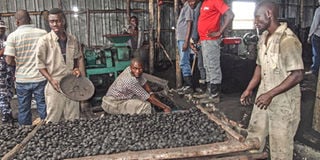Refugees embrace renewable energy

Work. Refugee youth make charcoal briquettes in Nakivale Resettlement Camp on Wednesday last week. PHOTO BY PAUL ADUDE
Arrangements to curb the rampant degradation of the environment in refugee settlement camps across the country have been finalised, senior government officials have revealed.
Under the arrangements, refugees are being wooed to participate in tree planting and making of charcoal briquettes for fuel and using materials that do not stress the environment, as one of the activities to mark the World Refugee Day commemorated on June 22. The day is dedicated to environment protection as a measure to curb the negative impact of climate change.
The Kyaka II Refugee Settlement commandant, Mr Robert Baryamwesiga, told Daily Monitor last week that they have received more than 80,000 new refugees since December 2017, which has worsened degradation of the green belts to pave way for cultivation and extraction of materials for building and fuel.
Kyaka II Settlement area in Kyegegwa District, measuring 74 square miles hosting more than 100,000 people, has been laid bare of trees due to settlements and cultivation for subsistence farming while Nakivale in Isingiro District hosts 109,820 refugees on a 71.9 square miles land.
Mr Baryamwesiga said apart from briquettes, energy-saving stoves are being constructed around the camp and refugees are undergoing a series of trainings on how to construct them but due to rural attitude, the refugees are still using the three-stone fire stoves.
“In any refugee influx, the environment is the first victim. To mitigate the damage, we look at minimising the cutting of trees for construction by giving them construction poles. We do the sensitisation and have marked out wetlands to ensure they do not encroach on them,” he said.
Mr Baryamwesiga said that most of the refugees come from rural settings and the type of houses that they construct are mostly mud and wattle, which calls for cutting a lot of trees for poles and reeds but they are now promoting the use of unburnt bricks to minimise pressure on plantations.
Mr Godfrey Byaruhanga, the proprietor of Angels Care Schools in Kyaka II, who owns a briquette factory, said their intervention to provide alternative source of fuel was to establish a source of income to support the school because the refugees do not have a stable income to pay for their children’s fees.
Mr Joseph Agotre, the assistant settlement commandant of Nakivale Refugee Settlement, said the project is meant to support environmental conservation through offering an alternative source of fuel as the population of the refugees increases.
“Refugees depend on the environment for everything yet the amount put in place to replenish what is being destroyed is very slim. A recent research discovered that refugees are using between 2.5kgs to 3kgs of fuel per day and if you calculate, Kyaka II with 100,000 people needs 300,000kgs of wood which is consumed every day but how much are we able to replenish every day?” he said.
He said lack of enough resource allocation to handle the environment remains one of the major challenges faced in the conservation of the environment.
Baryamwesiga attributes environment destruction to conflict between the host communities and influx of refugees.
Mr Godfrey Byaruhanga, the proprietor of Angels Care Schools in Kyaka II, who owns a briquette factory, said their intervention to provide alternative source of fuel was to establish a source of income to support the school because the refugees do not have a stable income to pay for their children’s fees.
Byaruhanga said besides briquettes making as an alternative source for firewood, the initiative is also meant to protect women and girls from sexual violence.
“What used to be a forested area up to 1990s has since been depleted due to the influx of refugee population that has caused the cutting down of trees.”
“We employ about 80 refugees because we want to create job opportunities for the refugees through sensitizing communities with my team on briquette making since most of the settlements don’t have natural trees” he says
Working with partners, Byaruhanga appeals for government intervention by putting in place a by- law banning the sale of traditional charcoal.
Mr Joseph Agotre, the assistant settlement commandant of Nakivale Refugee Settlement, said the charcoal briquettes factory in Kigali village is meant to support the environment conservation through offering an alternative source of fuel as the population of the refugees increases.
Other interventions
Mr Benson Nalihweera, the Assistant Community Services Officer for Kyaka II refugee settlement area said that community participation approach has enabled them to come up with the strategy of establishing woodlots to conserve the environment.
He said they have set up a number of nursery beds in the camp where seedlings are grown with 200,000 tree seedlings already planted in the settlement in both newly and old established woodlots.
Ms Constance Akiteng, the Assistant Environmental officer with Nsamizi Training institute working in the Nakivale Camp said other than briquette making, woodland measuring 20 acres has been set up around Lake Nakivale at the recommended buffer Zone to prevent refuge encroachment on the lake with cultivation.
Refugees
Uganda is host to more than one million refugees from the Democratic Republic of Congo, Burundi, and South Sudan, among other countries and these are spread in the camps across the country. However, the refugees are blamed for rendering bare refugee settlements following destruction of trees for firewood, charcoal and building materials.




